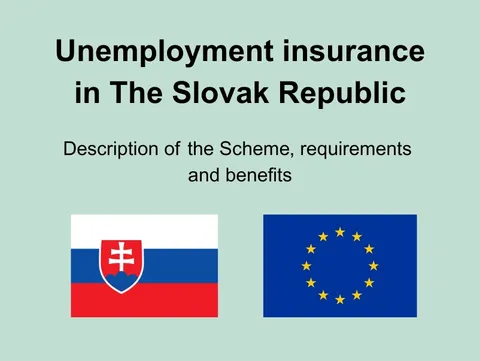EU
Slovakia
Unemployment
Insurance
Unemployment Insurance in EU->Slovakia
Unemployment insurance in Slovakia
You will find out more about your rights and obligations if you become unemployed in Slovakia or when you are looking for a job in another EU Member State. You will also learn how to proceed if you come from Slovakia and have lost a job abroad.
When can I apply for benefits?
In principle, you are entitled to employment benefits in the country of your most recent employment.
In the event you become unemployed as a cross-border worker, the payment of unemployment benefits primarily falls within the competence of the country of your residence. The Social Insurance Agency pays benefits to cross-border workers who were employed or self-employed in another EU Member State while being permanently resident in Slovakia. In addition, Slovak cross-border workers may also enquire about their rights at labour offices in the EU Member State, in which they most recently engaged in gainful activity.
If your last place of work was Slovakia, you are entitled to an unemployment benefit on condition that, while being registered at the local Office of Labour, Social Affairs and Family, your regular or occasional income from work or creative activity does not exceed the amount of subsistence minimum (i.e. €268.88 as of 1 July 2023) per month and this employment relationship does not exceed a total of 40 days per calendar year. It is your right to register, not your obligation.
What conditions do I have to meet?
You need to apply for your inclusion into the Jobseekers Register in person by submitting the written application for entry in the register or the application for entry in the register in case of repeated entry.
When visiting the local Office of Labour, Social Affairs and Family, competent according to your permanent residence or usual residence, you should bring a valid identity document (identity card or passport), documents on employment termination (agreement on employment termination, notice of employment termination, employment certificate), and school graduates should bring a certificate confirming the highest level of completed education.
You are obliged to actively seek new employment, for which you will demonstrate yourself in different ways on the dates and at places designated by the Office of Labour, Social Affairs and Family.
Within three to eight calendar days, you are obliged to notify any change in your personal information to the Office of Labour Social Affairs and Family and you should make yourself available within three business days from the date on which you were requested to do so by the Office of Labour, Social Affairs and Family.
When you want to seek employment in another EU Member State and, at the same time, you want to retain your entitlement to the unemployment benefit, you have to notify the Office of Labour, Social Affairs and Family of the date of your departure to another EU Member State.
What benefits can I apply for and how should I exercise my rights?
| Information and consulting services | Office of Labour, Social Affairs and Family (according to the place of permanent residence or usual residence) |
| Individual action plan (for disadvantaged applicants) | Office of Labour, Social Affairs and Family |
| Unemployment benefit | Social Insurance Agency |
You may apply for unemployment benefit (dávka v nezamestnanosti):
- at the branch office of the Social Insurance Agency competent according to the place of permanent residence in the form of the Application for Unemployment Benefit (Žiadosť o dávku v nezamestnanosti) or
- at the Office of Labour, Social Affairs and Family as part of the application for registration into the Jobseekers Register. If the Office of Labour, Social Affairs and Family does not register the insured person in the Jobseekers Register, the application for unemployment benefit will not be considered.
You become eligible for unemployment benefit provided that you were insured over a period of 4 years preceding your inclusion into the Jobseekers Register or you were voluntarily insured for a minimum period of 2 years. For example, self-employed fulfil the benefit eligibility criteria if they have wound up their business and, while still in business, have paid contributions to voluntary unemployment insurance.
The unemployment benefit is provided for a maximum of 6 months. The amount approximately corresponds to 50% of your last wage.
As a benefit beneficiary, you are obligated to notify the Social Insurance Agency in writing of any changes to your name, surname, or address of your residence (in the case of foreigners) and of your removal from the Jobseekers Register within a period of 8 days.
Jargon busters
- Gross wage - Total gross income, including taxes and other fees.
- Cross-border worker - Carries out activities as an employee or a self-employed person on the territory of one EU Member State while being resident on the territory of another EU Member State where s/he returns on a daily basis or at least once a week.
Required documents
- The transferrable portable document U1 (PD U1) document issued abroad, institutions competent for issuing of PDU1 in the Member States see here.
- Applications for employment services field.
- Application for entry into the Jobseekers Register.
- Application for Unemployment Benefit
Who do you need to contact for advice about social security?
Central Office of Labour, Social Affairs and Family (Ústredie práce, sociálnych vecí a rodiny)
Department of Employment Services
Špitálska 8, 812 67, Bratislava
List of Offices of Labour, Social Affairs and Family
Social Insurance Agency (Sociálna poisťovňa)
www.socpoist.sk
List of Social Insurance Agency branches in Slovakia
This page was last updated in 2024.
- Unemployment insurance in Europe →
Unemployment Insurance in Slovakia
You might also be interested in:
⇒EU social security coordination
⇒Unemployment Insurance in the Nordic countries
Key points of EU Unemployment Insurance coordination
- Transferring periods of work and insurance between EEA countries As an EU citizen you can transfer acquired rights from Unemployment Insurance when moving between EU/EEA contries. In this way it may be easier to become entitled to unemployment benefit in the country you move to.
In the vast majority of the Member states the aggregation rule become fully applicable as soon as you starts to work in the country. However in Denmark, Belgium and Finland you must work some period there before you can use the aggregation rule.
You need a PD U1 document in the country you leave or if the involved countries use electronically exhange (EESSI) there will be issued a SED U002. The countries who issues the highest number of PD U1 documents are Germany, Austria, Switzerland and the Netherlands. The countries who receives most PD U1 documents are Lithuania and Italy. - Transferring unemployment benefits Under certain conditions you can go to another EU country to look for work and continue to receive your unemployment benefits from the country where you became unemployed. The period you can export your unemployment benefits varies from 3 to 6 months in the different Member states.
You have to apply for a PD U2 document in the country you leave, or if you haven't done that the institution in the receiving country must request a SED U008 from the competent institution in your last country.
The countries who issues the highest number of PD U2 documents are Germany, Switzerland, the Netherlands and Denmark. Poland is the country who receives by far most PD U2 documents. - Unemployment benefits coverage According to OECD the net replacement of income after 2 months of unemployment, for a single person without children whose previous in-work earnings were 67% of the average wage varies from 33 percent (Ireland) to 91 percent (Belgium). Read more here..
- Having residence in another EU country than where you work? According to EU social security coordination rules you must only be insured against unemployment in one country at a time. As a generel rule this country is where you work.
In Member states who have compulsory insurance, you will automatically be covered when you start working there.
However you may be insured by your country of residence if you are posted to a EU/EEA country or work in two or more EU/EEA countries at a time. In these situations you can not your self decide where to have unemployment Insurance, but you (or your employer) must apply for a PD A1 document which states in which country you are covered by social security, including Unemployment Insurance. Special rule also apply for cross-border workers ("frontier workers"). - Third-country Nationals working in EU/EEANON-EEA citizens are covered by Unemployment Insurance in the EU countries who have compulsory Unemployment Insurance. In countries with voluntary Unemployment Insurance (Denmark, Sweden and Finland) third-country nationals can become member of an Unemployment Insurance Fund.
In the most countries Third-country nationals can also use the EU Coordination rules when moving within EU/EEA (however not in Denmark, Iceland, Liechtenstein, Norway and Switzerland).
Third-country nationals in short-tem working relations often faces problems with actually get Unemployment benefits, even though they have contributed to the system. This is due to the fact that one normally need a residence permit which allow one to take any job, and also because of a qualifying period in most countries between 6-12 months.

